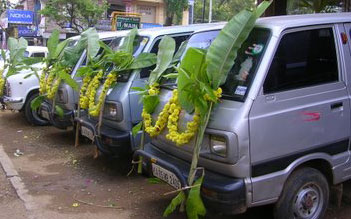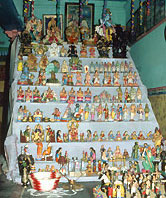Saraswati puja, Ayudha poojaSaraswati puja or Ayudha pooja is celebrated by the all over the worl by indains. This year 2014 the Saraswati puja or Ayudha pooja is fall in.
In some places it is called Dussehra, in some other places `Kalipuja'
or `Saraswathi Puja' and in still others, `Ayudha Puja'. It
is because of the Divine Mother is worshipped in her
different manifestations namely Durga, Saraswathi, Kali,
etc. The Puja in connection with Navarathri is known as
Bhuvaneswari puja that means the worship of `Universal
Mother'.

The last three days of the Navarathri are called Durgashtami,
Mahanavami and Vijayadasami, and they are considered more
sacred than the other days for Devi worship.
During these days, Saraswathi puja and Ayudha Puja are
performed. The Goddess Saraswathi is worshipped as the
Goddess of Learning, the deity of Gayathri, the fountain of
fine arts and science, and the symbol of supreme vedantic
knowledge. The importance of Ayudha Puja (the worship of
implements) on this occasion may be due to the fact that on
the Vijayadasami day, Arjuna took back his weapons, which he
had hidden in a Vani tree in order to lead a life in
disguise for the promised period of exile. It is believed
that one who begins or renovates his learning to work on the
Vijayadasami day will secure a grand success as Arjuna did
in Kurukshetra war.
On the Durgashtami day a ceremony called Poojavaipu is
performed in the evening.
The books and grandhas (holy books) are neatly arranged with
a picture or an image of Goddess Saraswathi in front. Then a
Puja is performed to Saraswathi during which fruits, beaten
rice, roasted paddy (malar), jaggery etc, are offered to
Her. These offerings are distributed among those present
when the Puja is over. Just before the Pujavaipu, all
studies and workare suspended.
On the Vijayadasami day after a Puja in the morning, the
Books and implements are removed from the room and this
ceremony is called `Puja Eduppu'. The time for the break up
of the puja marks the beginning of learning and work.
Learning and work commence at this auspicious moment.
Vijayadashami is also celebrated as the day of victory to
rejoice about Durga's triumph over the demons led by
Mahishasura. It is essentially a festival in honor of Durga,
another name for Parvathi, Lord Shiva's wife. Therefore the
famous 'Durga Puja' is carried out on this day.
Ezhuthinu Iruthu' or 'Vidyarambham' is performed at this
auspicious day. The children for the first time are given
instructions to write the first few alphabets on rice or
sand and according to custom only after this ceremony child
becomes entitled to write or read.
Kolu
Bommai Kolu is traditionally a women's festival that
Tamilians celebrate during Dasshera. Every year, a series of
steps is set up and kolu bommai or dolls are displayed.
These dolls typically depict gods or village scenes and
weddings. A kolu can be as simple or as elaborate as one
likes. The woman of the house invites other women to come
inspect the kolu, eat a few snacks, exchange a little gossip
and go home with a couple of small goodies.

During this time, the girls and women make rounds from house
to house during those nine days of Navrathri. Sundal is a
delicious confection made from bean sprouts and coconut that
is traditionally served at kolu. Women set up decorated
planks in a corner and place on it all the dolls in the
house. This beautiful clay figurines of gods and goddesses
are worshipped during Navaratri, viewing art as Divinity.
Women traditionally exchange gifts of coconuts, clothes and
sweets.
|
